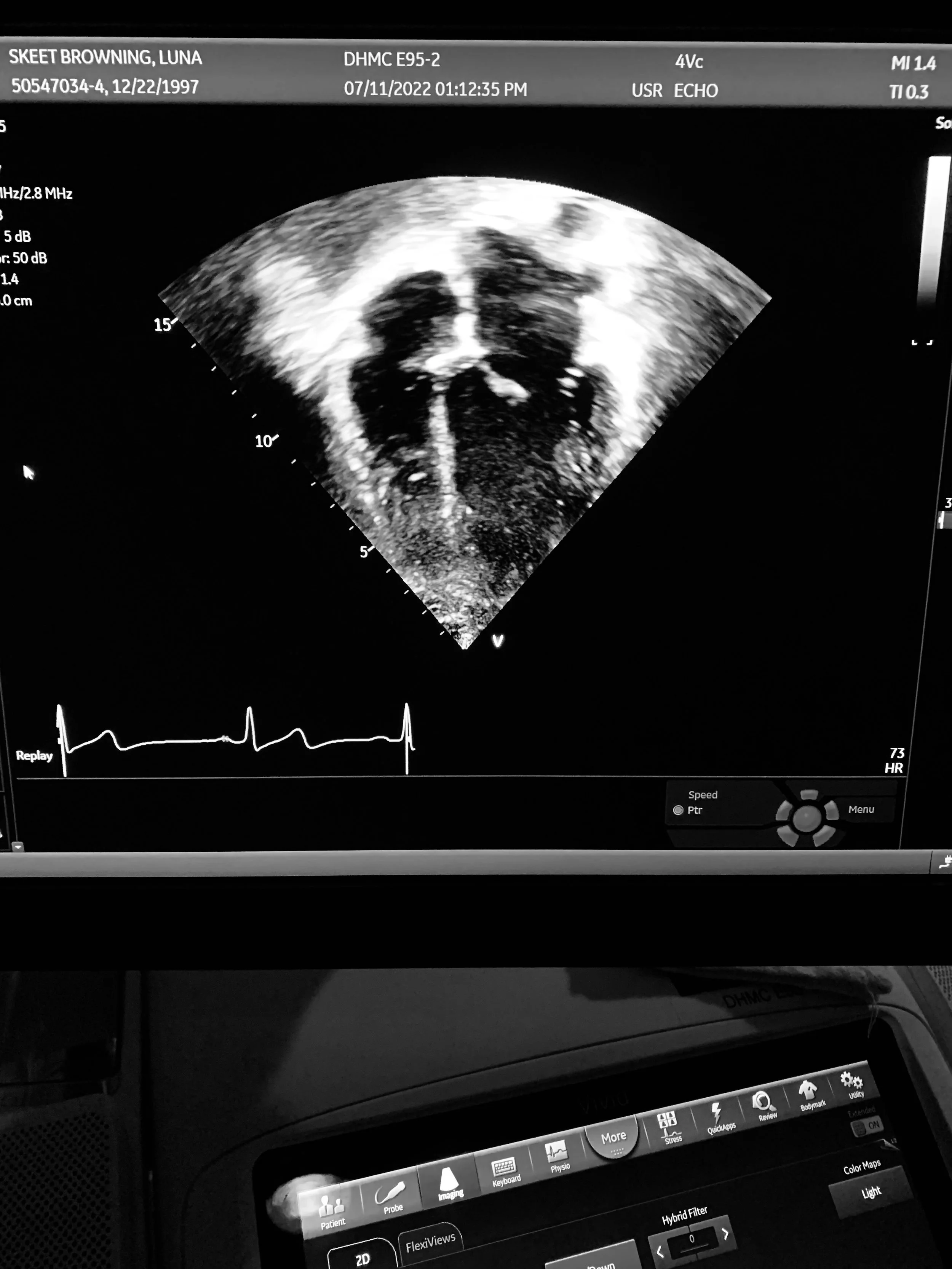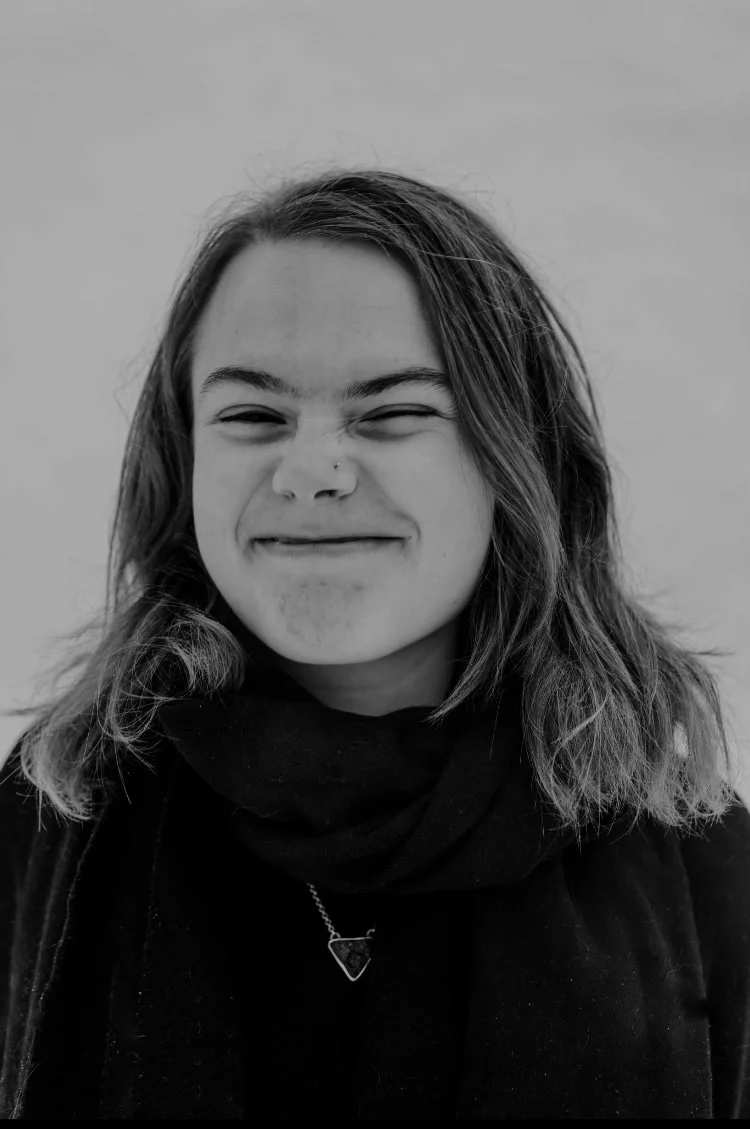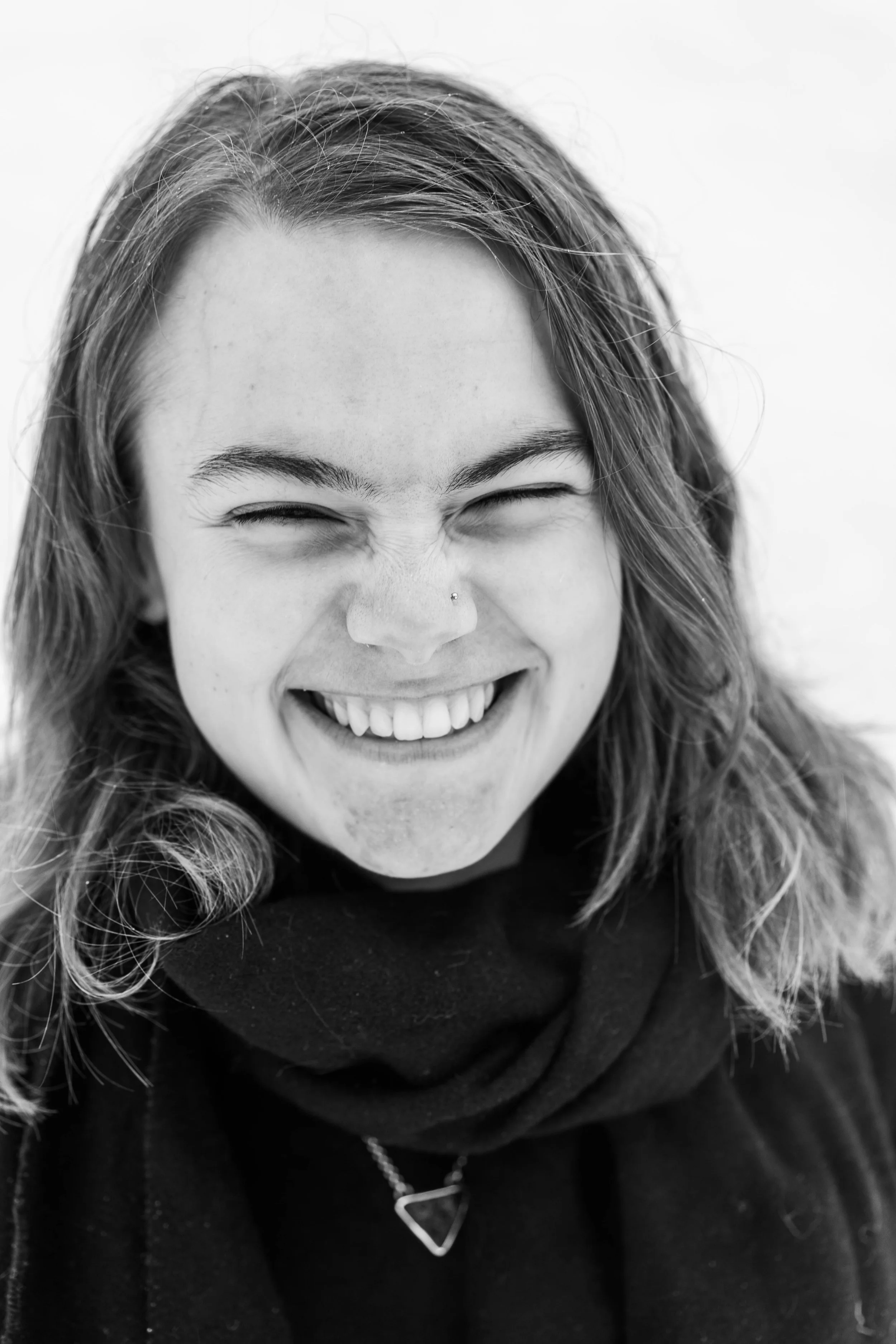There’s a 0.1-0.4% chance of being born with a hole in your heart. Fortunately it hasn’t affected me very much, but every couple of years I have a routine echo to make sure it’s still functioning well. I’ve read about people looking up to a similar image when they’re pregnant and feeling very emotional when they see their baby. And while I wouldn’t know about that particular experience, this is the first time in 24 years that I felt emotional when looking at my heart on the screen.
My body and I have been through a lot together the past few years. At best, I saw it as defective and unruly. At worst, there were some nights, especially when it became very painful to breathe, where I lay awake and worried that maybe I was, in fact, dying. Luckily the way I relate to my body is evolving, but seeing a visual in real time of the surprising force with which my heart is pumping blood nonstop was somewhat of a wakeup call, an undeniable reminder of how hard our bodies are working for us.
On not questioning the body.
My job lately has become not questioning my body. I’ve become extremely good at questioning over the years, but have lately put in a great deal of work to un-do and disregard the voices that made me begin to question myself in the first place. Largely diet culture ones, but others as well.
The work seems to be paying off, because the voice of my bodily intuition has only gotten louder recently. This was reinforced by eating roasted sweet potatoes and cabbage recently even though I knew it wasn’t what my body wanted because I “should” be able to, and then promptly throwing up after an extreme wave of nausea washed over me. I humbly thanked my body and took note.
Or I will start a podcast that looks interesting, only to be told that maybe a walk in the forest and disconnection is what I really need. I will contemplate journaling, then be drawn to a breakup playlist instead. If I’ve just woken up from 12 hours of sleep but still need to rest, I am learning to no longer ask (in much the same way I’ve been questioned by others on the validity of my experience), “but how can you really be feeling that tired? You should feel fine after so much rest.”
Now, there is an important distinction here between questioning ourselves vs questioning the truth of our body. When there are a lot of voices in our head it can get very messy and feel near impossible to distinguish what really belongs to us from what we’ve taken in to be truth based on cultural ideas and others’ opinions. For me, the feeling of relief is what marks a “successful” pivot, the relaxation that comes with going with the flow, instead of forcing against it. It’s an ongoing experiment and inner dialogue that will look different for everyone, one that above all else requires building trust and the safety to make mistakes.
Food won't fix you.
The “fix you” is really in invisible quotation marks because I do not believe that anyone is ever broken. But often we believe we are, and then we run around trying desperately to fix ourselves, and one of those things that we latch on to can end up being food.
I got into cleansing and detoxing not because I wanted what was best for my body and mind, but because I was looking for the quick fix. I wanted to fix my body and my life, both of which felt like they had gone off the rails.
Food is wonderful and medicinal, but it will never be everything. It will never replace the necessity of expression, of a well regulated nervous system, of fun. For a long time I refused to believe this because facing the deeper rooted problems felt too big and scary. The most nutritional meal plan in the world couldn’t fix the well of loneliness and the feelings of being lost and unworthy and that I’d really messed everything up.
Often we don’t even know what the real problems are, we just know that we’re stuck in a fight, flight or freeze response and we don’t know how to get out and everything feels overwhelming and too much.
If this resonates and you would like some extra support, I have two 1:1 spots open right now to work together.
When dealing with pain.
I remember reading once that relaxing during a vehicle collision would lessen the probability of injury, or even death. While there is some dispute around that particular fact, relaxing when we least want to has been an important reminder these past two weeks.
I’ve been experiencing an extremely high level of physical pain lately. A severe systemic nervous system inflammation, followed by another very inflamed back tooth, has led to feeling elevated pain day in and day out. While this is not something I would wish to prolong, and there’s no sugarcoating the rawness, it has forced me to become very embodied. When painkillers make only a dent, there’s no running away from the experience. There’s no way of distracting oneself, and, while it’s exhausting, it’s also very grounding.
We can become so used to resisting pain when it arises, whether emotional or physical, and often without even realizing that we’re doing it. We instantly label it as wrong. Often we blame ourselves. But what if we relaxed into the pain? What if it became a neutral experience? This does not mean ignoring the message. I definitely went to the dentist for my tooth. It means relaxing enough to hear what our body is telling (or shouting at) us, to be with ourselves in a softer way when there’s no instant fix.
Notes on experiencing long-term dis-ease.
Notes on experiencing a long term dis-ease:
Three years feels like a long time to be unwell. One could say it’s been a lot longer than three years, because I experienced extreme disordered eating for quite a while before then. But, three years of living with the fallout, of feeling exhausted from flip flopping between 12 hours of sleep and insomnia, of food reactions and food fear and brain fog and wild mood fluctuations.
Long term illnesses are very expensive financially. Between my parents and I we’ve spent thousands on supplements and out of network specialists after being told by multiple conventional doctors that they could do nothing for me. I feel very lucky to have access to the resources that we do, while also feeling repeatedly brokenhearted and outraged at how badly the U.S healthcare system fails the people who need it the most.
When you’re very unwell in your early 20s, there’s a grieving period for what is often referred to as “the prime of your life”. You know, that time when you’re establishing independence from your family, working for the dream, dating, networking, etc. Right now I cannot do “normal” things that one often does in their 20s, and I’ve needed to make peace with that reality. For a while I refused to accept the limitations, and would override them only to be out for days. Eventually I realized that it’s rarely worth doing that.
There is a roller coaster of feelings involved. There are days where I feel very at peace with the way my life has unfolded and everything that has led up to where I am now. Then there are those when I wake up feeling exhausted and in pain for the 967th day in a row and break down because I don’t want to do this anymore, don’t want to experience another day in a body that feels so entirely out of whack, where I feel overwhelmed, lonely, and behind in life, worried that it will be this way forever. There is no escape option though. Those are the days when I have learned to really slow down and be so soft with those parts, to make it entirely fine to watch my favourite show in bed for as long as is needed. To validate everything that I’m feeling as entirely normal and understandable.
Part 2 up next.
It's really not about the food.
There is a misconception about eating disorder recovery is that it’s mostly about food. Eat more, eat less, stop throwing up, follow the meal plan, become weight restored, lose weight, whatever. It’s not.
Real, lasting change requires learning how to set firm boundaries. How to start saying yes when we mean yes and no when we mean no. To repeatedly and bravely speak what’s real for you. To no longer put up with relationships, environments and beliefs that are not helping us be the person we know we’re meant to be and live the life we most want to be living. To remember how to have fun. It involves learning how to accept being disliked and rejected, but also embrace being more loved and seen than ever before. It’s a lot more nuanced than following a meal plan, but the exponential growth is endlessly rewarding.
Errors.
The inevitability of making mistakes as a human can be a tough pill to swallow.
When we accidentally hurt someone, when we are reactive, when we are reminded of our own messiness- do we armor up, become defensive, look away and pretend it never happened? Or can we sit with humility and allow it ground us, to further open us to the world?
Instead of categorizing them as failure, we can take the necessary steps to move forward and remedy our errors with grace. We can bow our heads and acknowledge that, even though we do the best we can, we always have more to learn, and that there is nothing wrong with that.
Loss of the fantasy.
Warning: eating disorder trigger.
When we experience grief over the loss of a person, environment, identity, etc, what we’re often grieving is the loss of the fantasy that whatever it was represented for us.
This was my experience with the loss of what I had come to think of as “the perfect” (aka thinnest) body. When restriction failed me and I gained a lot of weight, I grieved the feeling of being untouchable and forever in control. The numbed out fantasy world that I was floating in evaporated, and I landed flat on my face.
Fantasies are there for a reason. They give us perceived safety from a reality we’d rather not living be in. When the bubble bursts it’s frightening and might feel excruciating, but it’s from there that we are given the opportunity to build a life we won’t need or want to run away from.
Fun and nothingness.
Re-learning how to engage with expression for fun and nothingness right now, rather than as a means to an end.
After experiencing severe burnout from forcing myself to draw literally all day every day, I went multiple years without doing it at all. Before I had a logical “reason” for, say, spending the entire morning on a watercolor of a vase. “I can justify this because it’s for my animation portfolio. It’s work. It’s acceptable because it will eventually earn me money”.
The picture in the photo is an example of that. It was a birthday card for my grandma almost exactly a year ago, and it gave me a valid excuse to sit at my favorite cafe and lose myself in drawing the tree for 2 hours (or find myself, depending on how you look at it). ;)
It can feel scarier to do something just because we want to. Because it’s fun. Because it’s a necessity that we don’t understand but never goes away. This is when we enter the mystery of life, when we begin to admit to the existence of forces beyond us that we can’t wrap our logical minds around no matter how hard we reason. It becomes our invitation to wonder and to experience the world with new eyes.
It was never your fault.
My mentor and I were chatting today about the law of attraction, and the widespread idea that you need to take responsibility for vibrationally magnetizing the experiences in your life.
Unfortunately this is a very widespread notion in the new age spiritual world, and can cause large amount of emotional/psychological damage. It can make you feel terrible about yourself whenever your life isn’t all rainbows and unicorns, because your immediate thought becomes “what am I doing wrong to be attracting this?? Must. fix. my. vibration!!”
My dear, relax. The reality is a LOT more complex that that.
The truth is that it was never your fault. If you have been wrongfully treated, abused, etc, it was not your fault. You did not cause those experiences to happen. You did not deserve them because you were not meditating enough, or because you do not own enough moonlight charged crystals. While I am all about taking ownership and responsibility over what we CAN change in our lives, and while we can fiddle with the subconscious beliefs, energetic signatures, etc that are influencing you in a way that has a major impact on your quality of life, we also live in a reality and in a system where some things are simply out of our control. Covid is a perfect example of that. We can choose not to wear masks or get vaccinated, but the result is that certain environments, people and activities will then be off limits to us. We can find this angering and unfair, but it is the reality that we live in right now.
So let yourself off the hook. Keep a safe distance between you and anyone who tells you that you caused horrible events to happen. Take ownership of your life and remember that you are an extremely powerful being, while finding the relief in not needing to take responsibility for everything.
To love is to grieve.
During covid I unexpectedly entered into a relationship that we both knew had a natural end date. I’ve been thinking a lot about something my tea teacher, Mariana Rittenhouse, said during one of our ceremonies: that to love is to grieve. The two are inextricable.
Growing up we are more often than not fed two dimensional portrayals of romantic relationships that do not prepare us well for the complexity and messiness of real life. They do not do justice to the many layered forms of love, nor how grief can be a humbling reminder of our humanity. People walk into our lives when we need them to, and though we may grow to love them dearly, we recognize that sometimes it was not meant to be forever.
The days are becoming lighter now, and as the darkness of a long and difficult winter melts into Spring, the visceral reminder of the inevitability of change all around brings equal measure of relief and loss. Moving forward means accepting (no matter how reluctantly) the reality that some people and experiences exist in a vacuum and cannot be extracted from one another. But we can also draw comfort from the fact that the empty space in our lives will be filled with new people, new experiences. It will look different, but we can honor those difficult goodbyes while knowing that there will always be more out there waiting for us.
What's there.
I found these photographs recently in a forgotten file on my computer. They were taken four years ago on a film camera by a French acquaintance in a small town in Denmark, where we all slept in sleeping bags on the floor for a week in renovated army barracks and ate pickled fish on rye bread.
I’ve been missing Europe lately. I miss trains and meeting people who speak languages other than English, unexpected conversations and new friends. I knew I felt bummed out and housebound, but I was surprised (and a bit judgemental) to feel a lump in my throat when I mentioned to my therapist that I miss travel, at the depth of feeling that was there.
I have thought often of the people who are far worse off than me, who are struggling to make ends meet and working long hours, who have lost family members to covid. They are the ones that are allowed to feel grief, I was telling myself. Not you.
But feelings don’t like to conform to what we deem reasonable. Sometimes what’s being brought up has much deeper roots, unrelated to what’s going on on the surface. Which is why it is so important to validate those feelings, even if they seem petty and unjustifiable. We don’t need to make ourselves wrong for what’s there.






